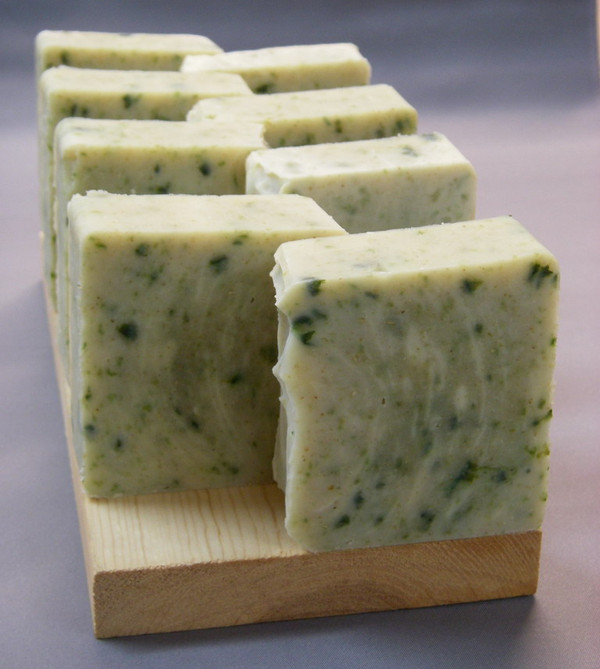HOME | DD
 BorosilicateArachnid — I make and I sell soap
BorosilicateArachnid — I make and I sell soap

Published: 2010-01-02 04:21:33 +0000 UTC; Views: 604; Favourites: 5; Downloads: 0
Redirect to original
Description
Well, okay I don't sell soap. I either use it up myself or give it away as gifts.When I make soap though, I can never settle on a recipe. The bar is always a bit too soft, or it's too drying, or it doesn't lather very well. So far, I have yet to find one so perfect that I can simply play around with the additives and leave the combination of oils alone. I have a good feeling about this one though.
I tried to make this a moisturizing bar. It has more castor oil than I usually use in it, glycerin, and oatmeal. All my bars use beeswax.
The scent is a blend of rosewood, rosemary, and peppermint essential oils and it is colored with crushed up nori seaweed (The sheets used for sushi). To my great horror, the soap smelled like seaweed over the essential oils when freshly poured, but by the time it was ready to cut, the seaweed smell had faded entirely. Lye is a cruel mistress and destroys many scents and colors, in this case working nicely to my advantage.
These bars have a 3-week cure time ahead before they can be used.
Related content
Comments: 12

there is a store near here that sells straight cocoa butter and shea butter- I know the store I work in has that in the soaps. want some?
👍: 0 ⏩: 0



Soap? 
👍: 0 ⏩: 0

Are there any other types of soap that would be practical to make and aren't based on lye?
Lye's nasty stuff as I'm sure you know.
👍: 0 ⏩: 2

Soap cannot be made without lye! The saponification process ensures that there is no 'lye' remaining in the soap.
👍: 0 ⏩: 1

Thanks for the info... it's all an interesting process that I don't know much about.
Bill
👍: 0 ⏩: 1

I love soap making....to my soapgeek mind it's fascinating how a substance suc as the lye can help make such a lovely product. I tend to superfat my soaps at around 7%, so that's 7% more oils than the lye can consume. This makes the soap moisturising as well as cleansing, and ensures that all the lye has been converted
👍: 0 ⏩: 0

If you want to make it from the oils and fats themselves, lye is the only way to go. If you want to make bars of soap, melt-and-pour bases are an option, but will not deliver the same quality or degree of control available when using lye.
👍: 0 ⏩: 1

That's good to know. Are there acidic chemicals that you can add after the lye has done its stuff so that the soap isn't so harsh?
Starting from scratch and a blank "canvas" is always more fun. I do that a lot with my cooking for example.
👍: 0 ⏩: 1

Well, the lye gets used up in the process, and turns into the sodium salts of the fatty acids that used to make up the fats, freeing glycerin in the process. These fatty acid salts will always be alkaline, but much less so than lye. I always use a few percent extra oils just to make sure I don't have any extra lye around when the soap is done curing. Certain oils tend to have certain attributes, though, based on what fatty acids they're composed of. Coconut oil and palm oil, for example make fairly drying soaps, but they harden the bar (make it last longer) and give it excellent lathering properties (pure coconut soap will lather in salt water and makes an excellent laundry soap). Other oils may be gentle, but foam poorly, or they may make a soft bar but lather well. Some oils bring nothing useful to the party and decrease the shelf life of the soap by going rancid readily. Vitamin E will help extend the shelf life of the bars. The key is striking a balance of various oils so the bar is fairly hard, lathers well, and is gentle. I'm still working on that.
This batch is a blend of olive, almond, coconut, palm, and castor oils with a small percentage of beeswax to help harden the bar.
For those who don't object to using animal fats, most make excellent soap without any of the nitpicky blending needed for vegetable oil soaps.
👍: 0 ⏩: 1

That's really interesting. All I ever knew about soap was from high school chemistry where we just made a little glob of soap from chemicals that I don't remember except for the NaOH (Lye)
👍: 0 ⏩: 0





























